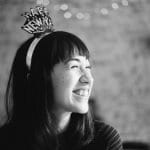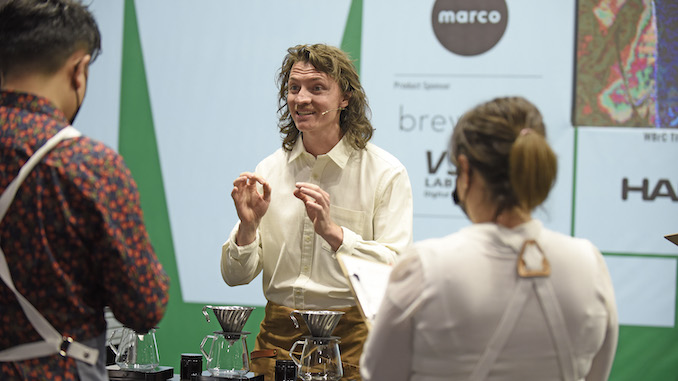
We chat with the newly crowned World Brewers Cup champion about his winning coffee blend, his training team, and what’s in store for future competitions.
BY KATRINA YENTCH
BARISTA MAGAZINE ONLINE
Cover photo courtesy of Specialty Pal for the Specialty Coffee Association
For many competitors, volunteers, and exhibitors, the most recent return to the World Coffee Champs stage was a blur. Everyone had their own ways of preparing after the COVID-induced hiatus, and for Australian barista Matt Winton, competing for Switzerland, it took every ounce of team effort that led to his winning coffee at the World Brewers Cup.
Although Matt hails from Australia, the aircraft engineer-turned coffee professional has gathered winning titles in Barista and Brewers Cup competitions as a representative for the European countries he has lived in—firstly as the Swedish Barista Champ in 2018/2019, and now under Switzerland. Matt used a blend of Eugenioides and Catucai for his competing coffee, which proved to be a common theme amongst competitors, showing the specialty-coffee community that not only are fantastic blends possible and delicious—but they can be non-Arabica, too. Matt’s winning brew ended up having only 30% Arabica in it. It was served in pink cups to highlight the intense strawberry and rose notes that the team experienced during tastings.
We spoke with Matt about formulating his coffee, the excitement of competing, and his adoration for the farmers who grew the coffees he incorporated into his blend.
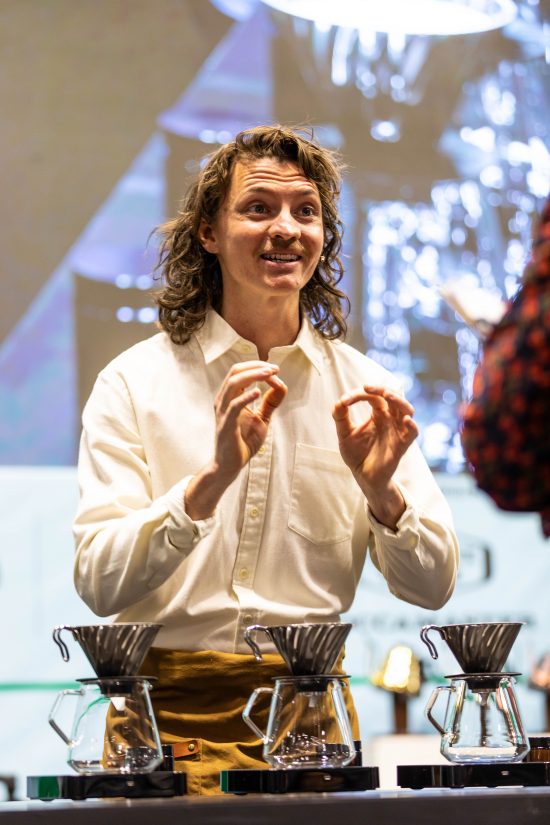
Katrina Yentch: You went from being a self-proclaimed novice brewer to becoming the World Brewers Cup Champion in just a couple years! What have been some of the most valuable tools you’ve used to improve in such a short time?
Matt Winton: I think having great coffees, time, and great people around me has been key to quick progress in brewing. I definitely stepped up since lockdown last year, when all I could do was stay at home and brew coffees—especially training compulsory. To be honest, most of the work was done in the seven days before the competition, when I got to Milan with Tom Balerin and Sam Corra. We really did such a deep dive in that week before, we got a lot done in a short space of time.
How did you decide on which coffees to use for your winning blend?
I traveled to Hacienda La Florida to stay and work with Fabricio Coronel and learnt so much about his exceptional agronomy practices, and how that meant we could get even better results in the cup from processing. Every single coffee that he produces is exceptional and unique, and he was so receptive to experimenting with little things that we both thought could give an interesting taste profile. In the end his Catucai, of all varietals, had such a unique expression that was so interesting it had me hooked.
We stumbled across the blend with Eugenioides, and had an expression from Finca Inmaculada that was so exceptional, where the quality had improved so much since last time I tasted it in 2019. Their work with this rare species is truly incredible—to take an unknown species and turn it into a worldwide phenomenon in just a few short years … wow. I am always in awe at the quality of every lot that comes out of Finca Inmaculada, and am very much looking forward to (visiting) soon!
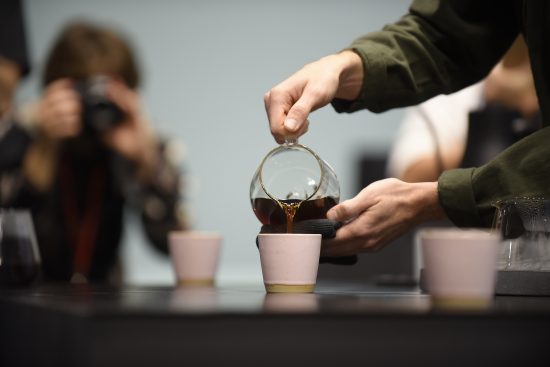
Your coffee was a blend of Eugenoides and Catucai—did you have any previous experience blending coffees? What was the process like to do that?
Since winning the Swiss competition last year, I’d been obsessed with the idea of blending. I started testing with blending for flavor during lockdown, and was just learning nonstop about what worked, and what didn’t work.
First, I locked in the Catucai from Ecuador, and it was almost by accident that we tried it with Eugenioides—and we were blown away by the result. The Eugenioides really brought all the structure and bottom end to the brew—and the Catucai provided all the top end notes, acidities, and some very unique flavors. Backstage we joked that in the end, with the Catucai being a part-Timor hybrid from the Icatu genetics, we realized that the brew contained only about 30% Arabica genetics!
I am in awe at how this concept of blending was not an isolated idea. Even though I never spoke to the other competitors who blended about it before the championships, we all had a common idea that came to us totally independently of each other. Then it grew through our own experiences and individual touches, to several unique expressions and presentations of the same idea! I love it!
You used a balance of magnesium and calcium to enhance the flavors of your competition coffee. How do those minerals highlight certain elements of the coffee you wanted to use?
Ahhh if only water was that easy! I had to simplify the explanation on stage—but it was an absolutely fine balance between all of the minerals used, their strengths, and the base water they’re mixed into!
We tried over 10 iterations of the brew water, and refined it as we went to get to the perfect brewing water for this blend. The water had such an impact on the entire expression of the cup—just 0.3% change of the concentration of the carbonate gave a huge impact in the cup. We actually ended up having to remake the water on the morning of both days of the competition because it “died“ and the brew tasted flat!
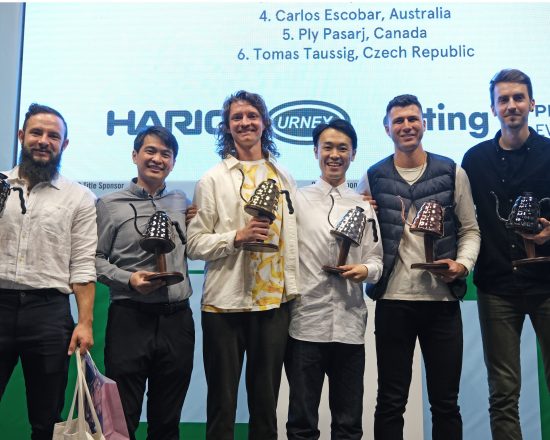
You’re very keen on making it clear that your win at Brewers Cup was a team effort. What kind of work goes into preparing for something like this as a team?
So much work was done by my team in the seven days leading up to the competitions. We worked harder than I’ve ever worked before, from dawn ’til well past dusk every day, just systematically improving the brewing and the routine.
Sam’s knowledge of brewing, water, roasting, and competitions helped to drive us further forward than any of us expected at the time. Tom’s dedication and passion meant he worked so hard, and did whatever was needed to make us produce our best. He drove me around, kept me sane, and gave all the feedback I needed for the routine. About four days before the competition, I handed over every decision of the coffee preparation to them, so I could simply focus on brewing and presenting. I feel like all the hard work we did together was done in the week before, and backstage, and then I simply presented our hard work on stage.
Of course also there is a massive team behind getting all of us to this point—all the way from our first mentors in coffee to the production of the coffee at the farm, competitors who came before us, and people who came to watch and give feedback on the routine. I think it’s easy to overlook all the people who got me to the stage—and I want to acknowledge everyone who helped get me there.
You’ve done several competitions now; what is your favorite part about competing? Do you plan on moving to another category after this win? Cup Tasters? CIGS?
Even though I’m mostly an introverted person, I absolutely love being on stage and the center of attention with competitions! I love the process of learning and growing with each competition I do, and meeting the people who help make it all happen! It’s all about the people involved!
I will almost definitely be back on stage making coffee soon! Probably going back to Barista competitions—I still have a few more things I’d like to share, and a few more improvements in the competitions.
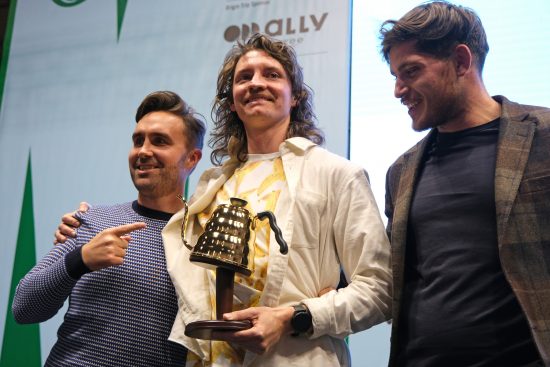
What is your everyday coffee life like when you’re not competing? I’m curious what it has been like especially during COVID.
It’s still quite fancy I think! Haha. I have a lot of choice on how to brew at home, and I love drinking some nice clean filters. At a café, I’m very happy to drink espresso, filters, or a cheeky little plant-based milky!
If you could drink the same black coffee every day for the rest of your life what would it be?
Probably a nice clean South American coffee—I’ve got a special place in my heart for washed Colombians, and Typicas from Ecuador!

